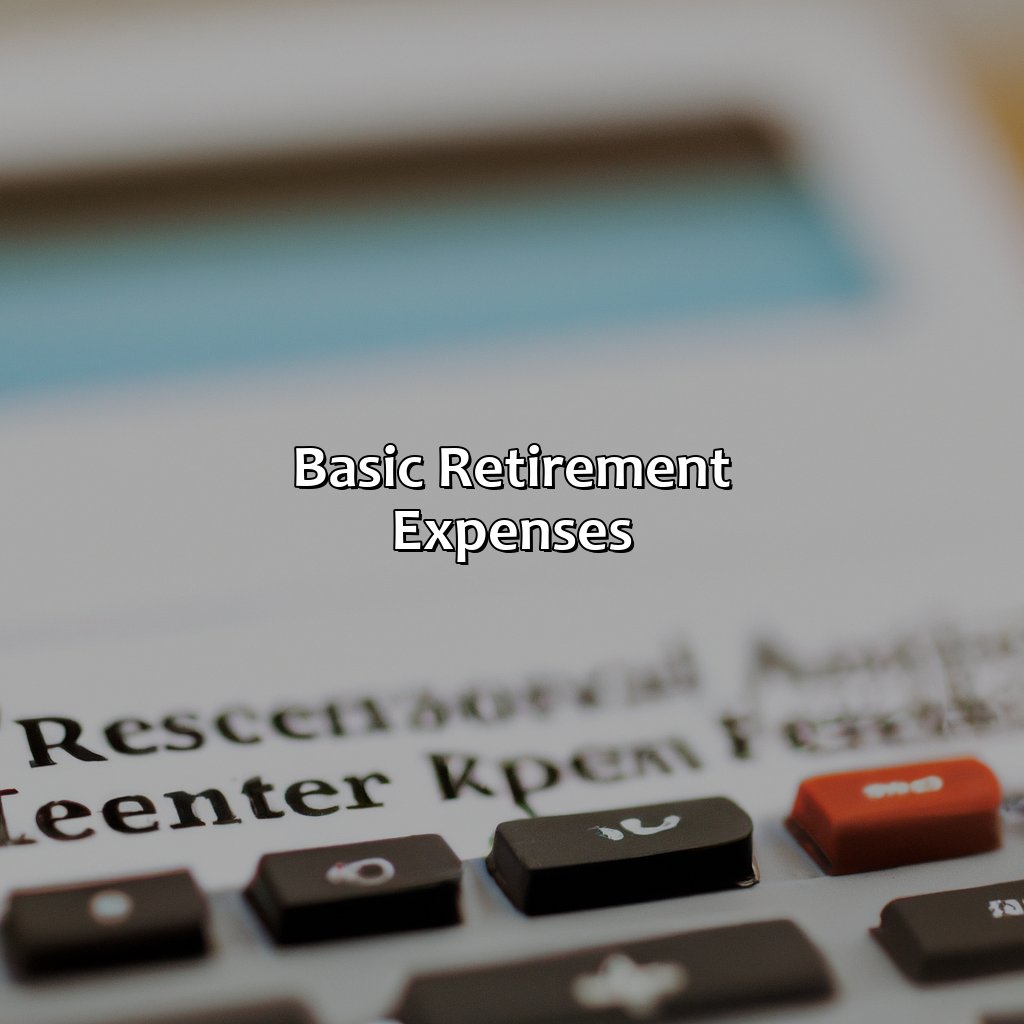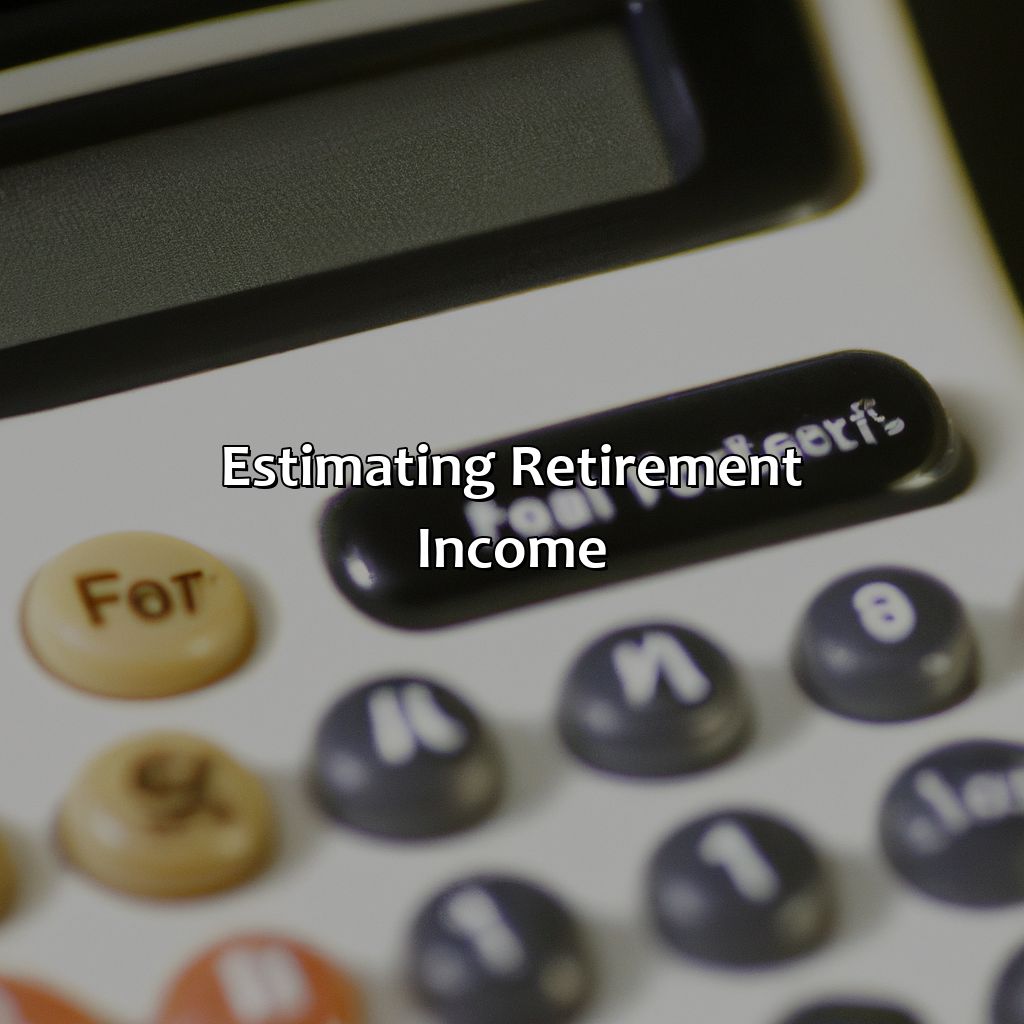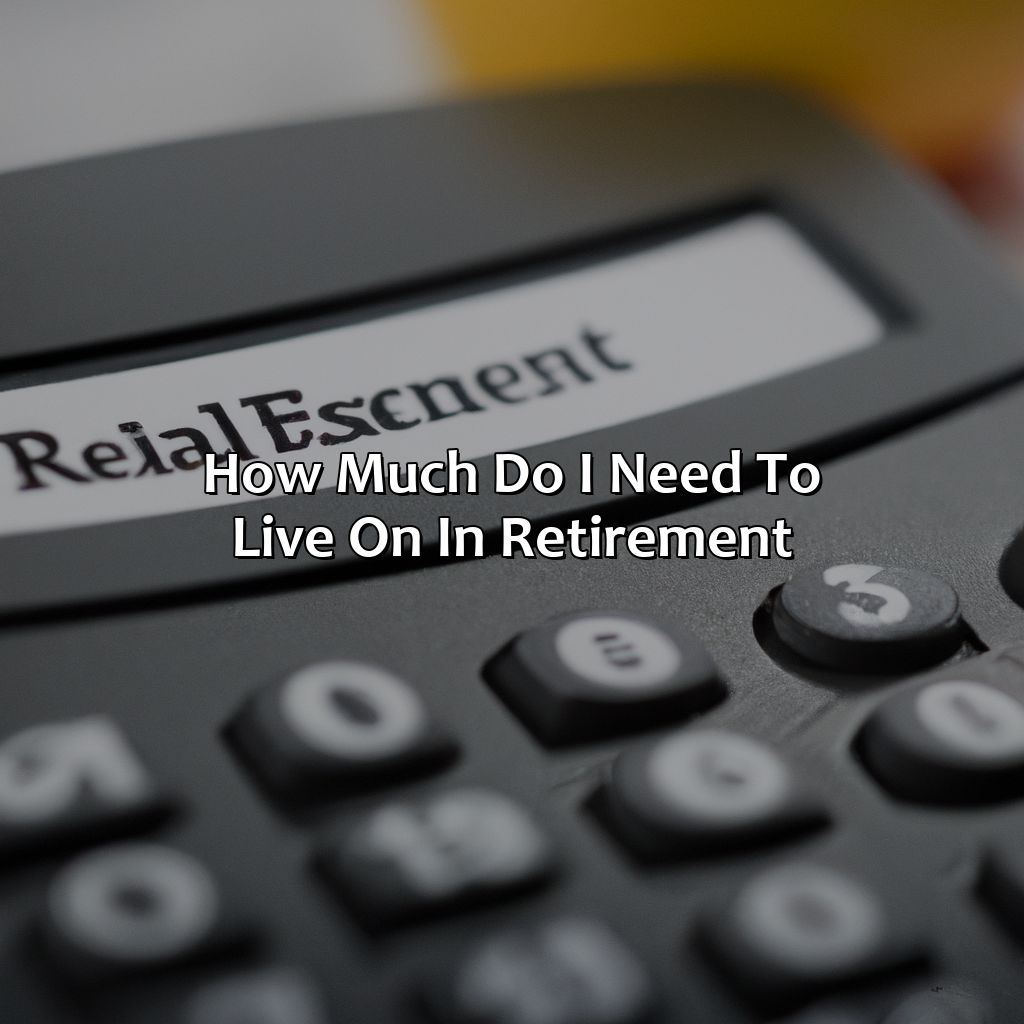How Much Do I Need To Live On In Retirement?
Key Takeaway:
- Basic retirement expenses include housing costs, food and household expenses, and transportation costs. These costs can make up the bulk of a retiree’s budget, so it’s important to plan ahead and budget accordingly.
- Healthcare expenses can be a major concern for retirees, with costs for Medicare coverage, prescription drugs, and long-term care potentially adding up quickly. Retirees should factor these expenses into their budget and consider getting financial help if needed.
- Leisure and miscellaneous expenses, such as entertainment and travel expenses, gifts and donations, and unexpected expenses, can also add up and should be included in a retiree’s budget. It’s important to plan for these expenses in advance to avoid financial stress.
- Estimating retirement income from sources such as Social Security benefits, pension income, and personal savings is crucial for creating an accurate retirement budget. Retirees should factor in all potential sources of income and plan accordingly.
- Planning and budgeting for retirement requires creating a retirement budget, making adjustments to one’s lifestyle, and seeking financial advice and assistance as needed. Retirees should stay on top of their finances and adjust their plans as needed to ensure a comfortable retirement.
Are you nearing retirement age and worried about your financial future? You’re not alone – many people wonder ‘how much do I need to live on in retirement?’ With this blog post, you’ll learn the steps to take to ensure a comfortable retirement.
Basic Retirement Expenses
Calculating retirement expenses? Break it down into 3 sections:
- Housing
- Food & Household
- Transportation
Understanding and managing these costs can help give you a better quality of life in retirement.

Image credits: retiregenz.com by David Woodhock
Housing Costs
When it comes to housing expenditures, it is vital to account for multiple aspects that can impact your financial situation positively or negatively. Primarily, the cost of your house or rent will affect this budget segment. The funding model can also differ depending on whether you outright own a property, have a mortgage that still needs repaying or are renting under a lease arrangement.
If you own a home and have paid off the mortgage, then housing can be one of the most affordable expense categories in retirement. However, if you’re still paying off your existing mortgage or have to take out new borrowings to secure surroundings for yourself in retirement years then this could significantly impact your budget. Additionally, maintenance costs for keeping up the property mustn’t be overlooked, as these costs usually rise with aging infrastructure.
On the other hand, if you opt to rent instead maintaining an ‘owned’ property in good order might involve negotiating contracts regarding air-conditioning and plumbing issues with your landlord. Yet, when renting after retiring, accessibility and support services availability located nearby are often reviewed by seniors as they strive towards ease of living.
To maintain low-cost accommodation expenses in retirement consider:
- owning your home outright before entering into these years;
- downsizing aka moving to a more modest location fitting better with preferences and financial capabilities.
To decrease maintenance expenses, contract licensed tradespeople rather than trying makeshift themselves.
Retirement may mean swapping fancy restaurants for budget-friendly grocery shopping, but hey, at least your napkins will match your curtains.
Food and Household Expenses
Covering the costs of daily life is an essential aspect of retirement budgeting. Expenses related to household and sustenance form a crucial part of retirement planning. Understanding the estimated expenditure can prove to be beneficial in creating a sustainable financial plan that lasts through one’s retirement period.
Household expenses that are routine and predictable, such as utilities, maintenance, and repairs, should be taken into account while planning for the future. These costs vary according to geography and lifestyle choices. Account for groceries, pet expenses or other essential daily purchases as they commonly fluctuate.
It is essential also to budget one-time house repairs such as roof replacements and furnace updates. Proper consideration for these unpredictable yet essential expenses will help to avoid earning a large debt volume during the later years.
Knowing how much it costs to maintain oneself’s standard of living during retirement can offer peace of mind while enjoying that phase in life without financial strains.
A friend retired early but did not realise that her transportation costs would amplify by approximately 30% during her first-year travel adventures across the country in her campervan. **Getting old doesn’t mean you have to slow down – it just means you have to start budgeting for a hovercraft.**
Transportation Costs
Transport Options in Retirement
Looking at transportation options when planning for retirement is crucial in ensuring smooth transition to the pension years. Here are 5 points to keep in mind:
- Consider whether owning and running a car or using public transportation would be more cost-effective.
- Factor in possible repairs, gas, parking fees, and insurance costs if you choose to own a vehicle.
- If you decide to use public transportation, consider any accompanying fares, schedules, or waiting times that may impact your daily routine.
- If you cannot drive anymore due to age or health reasons, research accessible transport services such as ride-sharing apps and door-to-door bus services especially designed for the elderly.
- When travelling for long distances or vacations, weigh up options like renting a car versus airline fares plus car hire on arrival.
It’s worth noting that advances in technology may bring new alternatives such as autonomous vehicles that could change how we think about transport altogether.
Pro Tip: Regularly reviewing your transportation costs can help identify opportunities for savings while maintaining suitable mobility.
Retirement may be the golden years, but healthcare expenses can quickly turn them into rusty ones.
Healthcare Expenses
Planning for retirement? Consider healthcare expenses. We’ll discuss solutions to make sure your financial future won’t suffer. Medicare Coverage, Prescription Drugs, and Long-Term Care- stay informed on these subsections!

Image credits: retiregenz.com by James Jones
Medicare Coverage
The coverage provided by Medicare plays a crucial role in healthcare expenses during retirement. It covers hospitalization, medical services, prescription drugs, and preventive care. This comprehensive program offers significant relief to retirees who struggle with high healthcare costs, making it essential to understand its benefits fully.
It’s important to note that Medicare does not cover all medical expenses, such as long-term care and prescription drug costs once you reach the coverage gap threshold. Therefore, it is crucial to have supplemental insurance policies or other plans in place to cover these gaps in coverage and avoid unexpected out-of-pocket expenses.
Furthermore, understanding the various parts of Medicare, such as Parts A, B, C and D can help retirees plan their healthcare expenses better. Various factors such as income thresholds and enrollment deadlines also play a substantial role in determining eligibility for different programs.
Research shows that the average out-of-pocket medical expenses for individuals above 65 years is around $5,000 annually (source: Fidelity). Hence careful planning and understanding of healthcare plans can ensure a comfortable retirement regarding finances.
Why break the bank on prescriptions when you can just invest in a good pill organizer and a bottle of generic aspirin?
Prescription Drugs
Prescription Medications:
The cost of prescription medications can be a significant healthcare expense for retirees. Medication prices have been increasing, making it important to budget accordingly. This may also involve exploring generic options and seeking assistance from programs like Medicare Part D.
It is essential to maintain good communication with your doctor and ensure that you only take necessary medications regularly. Avoid buying over-the-counter medicines without consulting the doctor. Conversely, adhering to prescribed medication helps prevent health risks and save on healthcare costs in cases where untreated chronic diseases worsen.
Furthermore, some retirement plans may offer prescription drug coverage or discount programs as part of their benefits package. It’s crucial to explore these options before retirement determines if they suit the individual.
A story of someone struggling with affordable prescription medications due to limited coverage despite having a valid insurance plan is not uncommon. Although the exact cost varies based on factors like location, income, and health status, being cautious about budgeting adequately for prescription drugs is vital for retirees’ long-term financial stability.
Long-term care insurance – because nursing homes aren’t known for their budget-friendly happy hours.
Long-Term Care
For those in their retirement years, planning for extended medical care is a vital aspect of financial management. This type of assistance focuses on providing long-term care to aging individuals and people with disabilities. Long-term care can include a range of services such as in-home care, assisted living facilities, nursing homes, and more.
To fully appreciate the significance of long-term healthcare planning, one must understand that it can be an expensive responsibility any retiree might undertake. These costs should be built into your financial plan to ensure that you are adequately covered. Adequate healthcare should not be compromised due to affordability.
It’s important to note that Medicare covers only some medical necessities and isn’t intended to pay for prolonged custodial or personal home assistance for daily activities such as taking showers and others like it. These expenses are usually out-of-pocket payments unless long-term insurance coverage has been purchased.
In sheer reality, entire lifetime savings can be put at risk due to unexpected yet unavoidable high costs incurred by some health crises if there is no suitable plan in place beforehand. The only thing protecting you is planning early; putting everything into motion while still healthy and actively earning an income makes perfect sense–and will pay off in spades when your bodily needs have become greater than your means to finance them.
Historically in the U.S., nursing home style long-term institutionalization facilitated by Medicaid once served as the bedrock foundation stone for folks needing ongoing assistance; this changed though as federal regulators displayed an increased emphasis on community-based care programs over time – so today options abound for addressing individualized requirements outside of clinical settings thanks to Medicaid’s Home- and Community-Based Services (HCBS).
Retirement may mean watching your expenses, but that doesn’t mean you should give up on the occasional spa day or book club meeting – after all, self-care is still care.
Leisure and Miscellaneous Expenses
Your retirement needs managing when it comes to Leisure and Misc. Expenses. This includes Entertainment, Travel, Gifts, Donations and Unexpected costs. Consider the costs and plan! You can have fun and stay within budget. The right approach helps you enjoy retirement.

Image credits: retiregenz.com by Joel Arnold
Entertainment and Travel Expenses
For individuals retiring, the expenses related to leisure and miscellaneous activities, including entertainment and travel, may vary depending on several factors. Exploring ways to reduce or budget these spending can help retirees maintain their lifestyles. To effectively manage entertainment and travel-related expenses in retirement, it is important to:
- Plan out activities
- Learn about discounts available for senior citizens
- Consider traveling off-season and being flexible with the location
In addition to regular entertainment and travel expenses during retirement, unexpected costs related to health issues can increase expenditures. Therefore, allocating a sufficient emergency fund can help relieve unexpected financial stress in times of need.
Pro Tip: Budgeting for entertainment and travel should not be overlooked when planning for retirement as they contribute significantly towards an individual’s quality of life.
Who needs gifts and donations when you’re retired? Just give me a good book and a cup of tea and I’m set for life.
Gifts and Donations
When it comes to Charitable Giving, it’s essential to consider how much you’d like to contribute towards social causes throughout your retirement. Here are 5 important points:
- Plan ahead and set goals for donation amounts annually or monthly.
- Consider giving non-cash items such as clothes, toys, or food which can also be donated to charity.
- Research the credibility of the charity before you donate and ensure transparency with its financial records.
- Use a Donor-Advised Fund, from which donations can be made at regular intervals over time.
- Create a budget that includes charitable donations alongside living expenses.
It’s worth noting that not all charitable contributions are tax-deductible, so make sure to verify these details before making any substantial donations. Pro tip: Setting up automatic transfers from your account can help maintain consistent contributions towards social causes without much hassle.
Retirement: When your unexpected expenses become your expected expenses.
Unexpected Expenses
During retirement, it is difficult to predict the exact amount of money needed for unexpected situations that may arise. These unforeseen expenses can vary depending on an individual’s lifestyle, health conditions and travel plans.
For instance, health-related costs could be a significant expense depending on the condition or disease one might encounter. Such bills may include medication, doctor visits or hospitalization costs and can quickly add up over time.
Another example of an unexpected expense is when property damage occurs. Extensive repairs or replacement can consume a considerable amount of funds, including insurance deductibles.
In addition to these examples mentioned above, there are other expenses that can come up unexpectedly like emergency travel or family events, legal fees or car repairs.
One of my colleagues had to bear the cost of kitchen renovations after water damage destroyed their cabinets and flooring.
Why estimate retirement income when you can just wing it and hope for the best?
Estimating Retirement Income
This section, titled “Estimating Retirement Income,” can help you work out your retirement income with Social Security benefits, Pension income and Personal Savings. Check out the sub-sections: “Social Security Benefits,” “Pension Income” and “Personal Savings.” Explore the benefits of each. Then you can put together a plan for a safe financial future during retirement.

Image credits: retiregenz.com by Adam Woodhock
Social Security Benefits
Receiving retirement benefits from the government can be crucial to ensure financial stability in retirement. These benefits are typically provided by the Social Security Administration (SSA), a government organization that provides income support to eligible retirees, their spouses, and dependents.
The amount of Social Security Benefits you receive is determined by several factors and varies from person to person. These factors include your age at the time of retirement, how long you have worked, and your earnings history. Additionally, if you decide to claim your benefits before reaching full retirement age, then the amount received each month will be reduced.
It’s important to keep in mind that Social Security Benefits may not provide enough income to maintain a comfortable lifestyle in retirement and should only be thought of as one source of income among many others. Therefore, it’s recommended that individuals consider other options such as employer-sponsored retirement plans or individual savings accounts to supplement their Social Security Benefits.
To maximize your overall retirement income and ensure financial security during this stage of life, it’s important to plan ahead and create a comprehensive strategy that considers all possible sources of income. Seeking advice from a financial advisor or utilizing online resources such as retirement calculators can be useful tools for estimating future retirement income.
As they say, a penny saved is a penny earned, unless of course you’re relying on a pension in which case you might need a few more pennies.
Pension Income
Retirement Pension Calculation
Determining your future pension income is essential for a successful retirement. Your pension fund contributions are invested in the stock market, bond funds or other investment options with varying levels of risk to yield a return that can be utilized in retirement. Understanding where your income will come from, how much you can expect and how to manage your expenses is critical for budgeting purposes.
When estimating your pension income, you need to consider many factors such as the pension scheme’s contribution percentage, employment period and retirement age. You may also choose to take cash lump sum schemes if available at the expense of reducing monthly incomes.
Additionally, it would help if you considered inflationary rises that may affect your pension payout over time. It’s prudent to consult an expert financial adviser who can guide you through this stage of planning for your golden years without neglecting future uncertainties.
According to a survey by Charles Schwab, Americans on average aimed at having a nest egg of $1.7 million for their retirement.
“I used to save money for a rainy day, but now I just save it for the day when I have to pretend to be happy in retirement.”
Personal Savings
Investment in oneself can lead to a comfortable retirement.
It is important to plan and save for the future, with the objective of achieving financial security in retirement. Building personal wealth through savings, investing in securities and properties are all avenues that can contribute towards fulfilling retirement needs.
To ensure one can maintain their standard of living after retirement, opt for automatic saving habits to put aside funds each month towards it. Tools such as compound interest calculators and projecting costs to account for inflation should be used to estimate necessary savings.
It is vital to remember that individual situations vary; there is no one-size-fits-all blueprint for retirement savings. Consultations with financial advisors or use of online resources like retirement calculators can offer guidance on financial plans tailored to specific goals.
According to Investopedia, the ideal amount individuals should have saved by age 30 is half their annual salary.
Don’t be afraid to tighten the purse strings now, because in retirement, you’ll be wearing them as a belt.
Budgeting and Planning for Retirement
Planning for retirement and managing funds wisely? Budgeting and Planning for Retirement has the answer! Create a Retirement Budget, Adjust your Lifestyle, and Seek Financial Advice and Assistance – these sub-sections will help you to understand and plan for retirement.

Image credits: retiregenz.com by James Duncun
Creating a Retirement Budget
When planning for your golden years, it’s important to consider how much money you’ll need to live comfortably in retirement. Calculating a retirement budget can be done by factoring in living expenses, healthcare costs, and unexpected expenses. Be sure to also plan for any additional leisure activities or travel plans you may have during retirement.
One way to create a retirement budget is to start by tracking your current spending habits and identifying areas where you can cut costs. This will help you understand your baseline expenses and determine how much income you’ll need during retirement. It’s also beneficial to consult with a financial advisor who can help guide you through the process and identify any potential gaps in your savings plan.
Remember that creating a retirement budget is not a one-time task but rather an ongoing process as financial situations may change over time. Reevaluating your budget every few years or after significant life changes, such as a move or health event, can ensure that you’re on track for a successful and stress-free retirement.
Pro Tip: Don’t forget about inflation when creating your retirement budget. Adjusting for yearly increases in living expenses will ensure that your savings last throughout your entire retirement journey.
You could always sell your soul for a beach house, but downsizing your avocado toast addiction might be easier.
Making Adjustments to Lifestyle
Retiring comes with significant financial deliberations, which determine your lifestyle. It’s vital to adjust your living expenses as per the pension plan. Cutting back on luxury expenses or downsizing to a smaller home can significantly impact your retirement expenditure. Be mindful of budgeting and planning these adjustments to make it easier for yourself later on.
Making crucial lifestyle adjustments is key during retirement. Consider parking your car, walking more frequently, and switching to a less expensive insurance plan to save money in the long run. Additionally, reassess your entertainment costs and try cutting back on items like frequent trips or eating out at restaurants regularly.
It’s essential to derive satisfaction from being financially secure and living comfortably in retirement without degrading quality of life. This necessitates minimizing essential expenses such as food and utilities that you can control while making considered lifestyle changes or movements that work best for you.
Consider downsizing your house by either moving into community housing or reducing the number of rooms that need heating/cooling maintenance. Make sure you keep track of regular expenses and remove anything unnecessary that chips into your savings goals. Consolidating debts by paying them off early then ridding yourself of any credit card debt before retiring helps increase daily spending power in retirements.
Seeking Financial Advice and Assistance
To enhance financial security in retirement, it is crucial to seek consultation and guidance from financial advisors. These experts provide valuable insights into creating a personalized retirement plan tailored to one’s income sources, expenses, and savings.
With the assistance of a financial advisor, individuals can better navigate complicated topics such as investment strategy, insurance policies, taxes, and Social Security benefits. By creating an individualized plan for retirement with the help of an advisor, one can be more financially prepared for the transition into this new stage of life.
In addition to seeking professional advice, using online resources like retirement calculators and budgeting tools can offer another layer of guidance. It is essential to utilize all available technologies and resources when planning for retirement. By utilizing these tools and expert advice, individuals can feel more confident in their financial footing as they approach retirement.
Some Facts About How Much Do I Need to Live On in Retirement:
The average retiree spends about $46,000 per year. (Source: U.S. News)
Experts recommend having at least 80% of your pre-retirement income for retirement. (Source: The Balance)
Social Security benefits typically account for 40% of a retiree’s income. (Source: AARP)
Healthcare expenses can be a significant burden for retirees, with the average retiree spending around $4,300 per year on healthcare. (Source: Fidelity)
Financial advisors recommend starting to save for retirement as early as possible to maximize savings and compound interest. (Source: Investopedia)
FAQs about How Much Do I Need To Live On In Retirement?
How much do I need to live on in retirement?
There is no definitive answer to this question as it depends on a number of factors including your lifestyle, health, expenses, and retirement goals. However, a general rule of thumb is to save enough to replace about 70% to 80% of your pre-retirement income. Therefore, if you earn $100,000 per year, you would need around $70,000 to $80,000 per year in retirement income.
Is social security enough to live on in retirement?
No, social security typically is not enough to live on in retirement. The average social security check is around $1500 per month, which amounts to $18,000 per year. This is significantly less than what most people require to maintain their lifestyle in retirement.
How do I calculate how much money I need for retirement?
You can use retirement calculators to determine how much money you need to save for retirement. These online tools take into account your current age, income, expenses, and retirement goals to give you an estimate of the amount of money you need to save for retirement.
What are some expenses I should consider when calculating my retirement income needs?
You should consider all of your expenses when calculating your retirement income needs, including housing, healthcare, food, transportation, entertainment, and travel. It’s important to account for inflation and unexpected expenses as well.
What is the 4% rule for retirement?
The 4% rule is a general guideline that suggests withdrawing 4% of your retirement savings at the beginning of each year, adjusting that amount for inflation each year thereafter. The goal is to provide a steady stream of income throughout retirement while minimizing the risk of running out of money.
What are some tips for saving for retirement?
Some tips for saving for retirement include setting a retirement goal, contributing to a 401(k) or IRA, living below your means, avoiding debt, and increasing your savings rate over time. It’s also important to consult with a financial advisor to ensure that you are on track to achieve your retirement goals.
 Checkout this IRS Loophole
Checkout this IRS Loophole 






